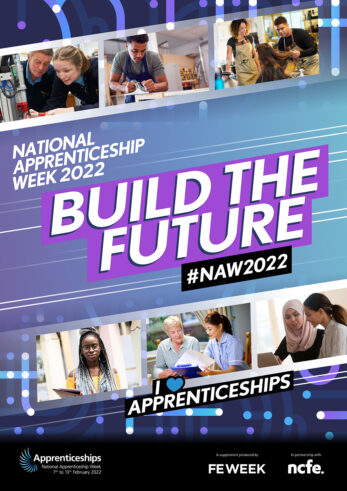Welcome to FE Week’s special supplement marking 2022’s National Apprenticeship Week. We’re proud to be able to bring together voices from the range of players working together to make apprenticeships a success; from the politicians and policymakers to the apprentices themselves.
Post-Covid
This year’s focus is unsurprisingly on emerging from the pandemic and understanding the new world of work, but you’ll see too that some familiar challenges have resurfaced as we adjust to life after the Covid crisis.
Pleasingly, there are some strong signs of recovery in apprenticeships starts based on the most recent government data. This is of course good news, but it would be easy for policymakers to get carried away here. The number of starts is, after all, just one measure and apprenticeships find themselves in a fairly unique place in the education system where the number of people starting a programme is given much higher prominence relative to the number of people completing successfully. Why is that?
Measuring apprenticeship completions and outcomes correctly comes up throughout this supplement and is clearly an issue the sector is keen to see addressed this year. Funding too is never far from the discussion. FE Week’s deputy editor Billy Camden challenges the further education minister on both of these issues in an exclusive interview on page 5.
Apprentices’ pensions
How much do you know about apprentices’ pensions? In an illuminating piece on page 14, Annabel May from the National Society of Apprentices uncovers an area rarely discussed. We also feature Holly and Jasmine, both from the Association of Apprentices, who write powerfully about their experience as degree apprentices and the difference that finding a community of apprentices has made to them.
Growth in higher level and degree apprenticeships is perhaps one of the most stand-out developments in apprenticeship policy in recent years. FE Week’s senior reporter, Will Nott, talks to the UCAS chief executive about how to meet ever-rising demand for degree apprenticeship places on page 21.
Meeting demand, growing starts, improving outcomes – none of that can happen without the people teaching, training and assessing apprentices day in day out. The Education and Training Foundation’s Paul Kessell-Holland gets underneath the changing roles of the front-line assessors and trainers on page 19.
Looking ahead
Looking ahead, what do we want to be able to say about apprenticeships for next year’s National Apprenticeships Week?
This year we’ll see the first flexi-job apprenticeships where apprentices will work with multiple employers over the course of their programme. Will we see even more flexibilities funding policy to remove barriers for small businesses? One thing is for sure – as this supplement proves – the sector isn’t short on ideas and innovations to keep making apprenticeships even greater.
















Your thoughts